
Tel: 551-580-4856 | Email: F.WINNIE.S@GMAIL.COM
Selling Homes Privately, via ‘Pocket Listings,’ Is on the Upswing
Some brokers say houses that are not posted publicly give buyers a chance to get into the market, others say the practice violates fair housing laws.
By Debra Kamin
10/09/2021

In April, as the frenzied real estate market approached a fever pitch, Bridget Medina jumped into the fray. In doing so, she had a distinct advantage over other buyers in the market for a family home in the suburbs of New Jersey: a broker was showing her houses that had not been publicly listed.
Pocket listings, the practice of brokers selling a home through private networks rather than on the open market, have skyrocketed during the pandemic. One analysis from Redfin put the increase at 67 percent, and in some markets, it’s estimated that as many as 20 percent of all listings are now available only to buyers with the connections to hear about them in the first place.
Brokers and buyers alike credit these secret listings with offering a leg up in a lopsided market where demand far outstrips supply. But detractors say they aggravate inequalities in a housing market already plagued by racial and socioeconomic disparity.
Pocket listings have become so commonplace that in November 2019, the National Association of Realtors prohibited the practice for its 1.5 million members, who represent about three quarters of active real estate agents in the United States. But violators must be reported by their peers, and are generally subject to only small fines.
Ms. Medina and her husband, Rudy, found their four-bedroom house in Bloomfield, N.J., after bidding on a similar property on the same block. They were outbid, but the owner tipped her broker off to a neighbor who was also getting ready to sell.
“He called my Realtor and said, ‘I like Bridget and Rudy, and their kids are so cute. They’d fit in so well in this neighborhood, and I think my neighbor down the street is selling her house,’” she said. “He gave her their number.”

A few days later, Ms. Medina and her family were back in Bloomfield, sitting around the dining room table of that neighbor’s house. They made an offer the same day, and moved in six weeks later.
The national association now requires its member brokers to publish all properties on its multiple listing service (MLS) within 24 hours of publicly marketing them in any way. But loopholes abound. The association does not enforce the ban — they leave it to local broker organizations to identify offenders and set penalties. And agents are still permitted to circulate listings privately within their own brokerage, or market properties as “coming soon.”
“Since the pandemic, real estate professionals have found ways around the policy,” said Matt Lavinder, president of New Again Houses, a home-flipping company. Brokers are using WhatsApp, Discord and Telegram chats to privately share listings as well, he said. “This has become a secondary market.”
Pocket listings exist in a gray space between legal and illegal, said Andrew M. Lieb, an attorney and the founder of the Lieb School, a licensed New York State real estate school. The U.S. Department of Justice has argued that the practice could violate antitrust laws. They are also potentially discriminatory.
“It could be argued that they violate the Fair Housing Act,” Mr. Lieb said, because they could contribute to disparate impact discrimination, a phenomenon in which a seemingly neutral policy is disproportionately unfair to one specific group. While no such case has yet to be brought to court, there is precedent: The National Fair Housing Alliance sued Redfin in October 2020 for setting minimum price requirements on the homes it lists, a practice the alliance alleges discriminates against minority communities. According to Morgan Williams, the alliance’s general counsel, both parties have agreed to stay further litigation pending active settlement negotiations. In the meantime, Redfin has yet to change its minimum-price policy.
“By analogy, this is the same concept,” Mr. Lieb said.
However, Glenn Kelman, the chief executive of Redfin, has been a vocal detractor of pocket listings, referring to them as “a relic from the real estate industry’s old history of perpetuating segregation” in a May 2021 opinion piece in Inman, a trade publication. And the national association’s loophole that allows for brokerage-exclusive listings, he said, has unintentionally created monopolies among bigger brokerages.
Not all brokers agree that pocket listings represent unfair competition or are damaging to minority groups.
“I let all my agents know that as long as you’re not advertising the property to the public, you’re good to go,” said Sharelle Rosado, a broker in Tampa. At her brokerage Allure Realty, she said the use of pocket listings has increased 40 percent since the start of the pandemic. She leans on connections with both sellers and developers to build her pipeline of potential off-market sales. They are particularly helpful, she said, when working with high-income buyers looking for homes in the $10 million range, where inventory has always been tight.
“A lot of people are not for pocket listings, but it helps our clients, and it’s beneficial to both sides,” she said. “And I don’t have to split the commission.”
Pocket listings can appeal to sellers because they allow for home transactions without multiple showings, and the specter of strangers marching through their rooms. Many brokers tell their clients that pocket listing a home is a good way to test the market before officially setting its price.

For Stacey A. Giulianti, whose job as chief legal officer of an insurance company required a recent move from Maine to Florida, the practice had appeal.
“I told my agent, I want to sell, but I really want to see what I can get for it,” he said of his three-bedroom colonial in Cumberland, Maine, which he sold as a pocket listing for $1.75 million in May. “I didn’t want people tracking through my house.”
For buyers, however, pocket listings can eliminate checks on price inflation that the open market would instill.
John Boese, 46, runs an internet start-up in Los Angeles. He has been searching for a home for his mother in nearby Simi Valley for several months, but grew suspicious after a real estate agent repeatedly steered him toward off-market homes that felt overpriced.
“He kept telling me, ‘I’ve found this amazing house that’s not on the market yet, and you should get it now, because in two days it will be on the market at 20 percent more,” Mr. Boese said.
The agent was also listing the homes as “coming soon” on sites like Zillow, then removing them for a week and doing it again.
“He was telling everyone it was a pocket listing,” Mr. Boese said. “And pricing the homes much higher than they were worth in hopes of getting someone to bite on an unfair price.”
The influx of property technology companies — which allow people to digitally browse, sell, research and invest in homes — have flooded the market and pushed buyers to increasingly shop for real estate online. Proptech is also credited with ramping up demand for pocket listings — for brokers, they offer a competitive advantage.
Dozens of high-end brokerages, including Long & Foster and Bespoke, now offer buyers online access to curated, private databases of off-market homes. Aalto, a San Francisco-area marketplace, removes the middleman on pocket listings by connecting buyers directly with sellers, and DropOffer, a public online portal allowing buyers and their brokers to submit offers on homes that are not officially on the market, will launch in October.
“Any successful agent has utilized the off-market, but in the past it was a manual process,” said Greg Burns, a DropOffer co-founder. “The struggle has always been inventory.”
But even with the egalitarian influence of the internet, pocket listings are still, in their essence, all about insider knowledge.
And prohibitions on them will remain feeble, said Mr. Lieb, the real estate attorney, as long as the onus is on brokers to police their own colleagues. The past year’s spike in closed-circle real estate transactions could have long-term ramifications.
“There are secondary and tertiary effects, for generations to come,” he said. “A pocket listing is only going to allow people that are in the in-crowd to be living there. And you have to look that way and talk that way to get there.”
免费讲座,欢迎报名
美国股市动荡,适于做空,如何操作?
Monday, Oct 11, 2021, 美东 9PM / 美西 6PM
如果你在谷歌上搜索:“美国牛市持续多久?”,它会回答说:“美国牛市平均持续 973 天,或 2.7 年。”
但事实是:我们已经进入了当前美国牛市的第12年,创下纪录的牛市记录。然而,这轮牛市还能坚持多久? 我们应该担心吗? 我们如何对冲风险并保护我们的投资组合? 我们应该做空市场吗?
本周的 HedgeBee Monday Live,加入我们与屡获殊荣的对冲基金的分享,讨论如何产生与大盘无关的绝对回报。
* 如何驾驭市场波动?
* 如何通过空头头寸对冲您的投资组合?
* 期权叠加如何赋能交易策略?
请扫描海报上二维码:
或直接点击 Zoom 报名链接:
https://zoom.us/webinar/register/6316336221018/WN_yvmcDteARpGx4yjf2g3mww
关于HedgeBee:
HedgeBee是由斯坦福校友团队创立、为日常投资者打造的投资信息平台。我们的目标是让专业的金融管理变得更简单和个性化、利用社交媒体和人工智能重新定义数千万人的主动投资体验。
HedgeBee
诚招美国和加拿大法律服务代理
因公司发展需要,诚招美国和加拿大法律服务代理。
要求:
懂英语、或西班牙语、或法语。
能合法工作有社安号或工号。
无需改行, 可以兼职。
大学生和有销售经验优先考虑。
自雇生意公司发美国报税1099,加拿大T4A
有意了解详情, 请扫码加微信, 非诚勿扰!

Home-flipping profits are shrinking, but here’s where you can net the most
By Diana Olick
9/27/2021
KEY POINTS
- During the second quarter of this year, close to 80,000 single-family homes and condominiums were flipped.
- The gross profit on a typical flip rose to $67,000. But the return on investment shrunk to a decade low.
- Of course all real estate is local, and flippers in some markets are seeing higher profits than in others.
Home flipping has never been easy, no matter how much fun TV shows like “Flip or Flop” make it out to be.
It’s been even harder lately, due to low supply, high prices and a run on housing triggered by the coronavirus pandemic.
Flipping a home is defined as buying and reselling the same home within a 12-month period, and profits rely heavily on both the health of the housing market as well as the cost to flip. Most flippers will upgrade or improve the house in some way to increase their returns.
Despite the long list of obstacles, close to 80,000 single-family homes and condominiums were flipped during the second quarter of this year, according to property database Attom. That represents nearly 5% of all home sales. While the volume is lower than the average seen over the past decade, it is the first increase in flipping in more than a year.
The profits, however, are shrinking. The gross profit on a typical flip rose to $67,000 in the second quarter as home values increased. But the return on investment, which is calculated after all the costs of the flip are factored in, dropped.
The return was just 33.5% in the second quarter, down from 37% in the quarter before and down from 40% in the second quarter of 2020. Investors are now seeing the lowest returns since 2011, when the housing market had yet to begin its recovery from the subprime mortgage crash.
“It’s not like home flipping has become a losing proposition. A 33% profit on a short-term investment remained pretty decent, even after renovation and holding expenses,” said Todd Teta, chief product officer at Attom. “But with a few more periods like the second quarter of this year, investors may need to reframe how they look at these deals.”
Of course all real estate is local, and flippers in some markets are seeing higher profits than in others.
Metropolitan areas showing the largest flipping returns on investment:
- Oklahoma City (196%)
- Fargo, North Dakota (185%)
- Pittsburgh (154%)
- Omaha, Nebraska (135%)
- Philadelphia (100%)
- Buffalo, New York (93%)
- Baltimore (91%)
Areas seeing the smallest profits on home flips:
- Gulfport, Mississippi (- 8%);
- Corpus Christi, Texas (+ 0.7%)
- College Station, Texas (+ 1%)
- Longview, Texas (+ 7%)
- Daphne-Fairhope, Alabama (+ 8.5%)
Returns are shrinking for several reasons. Home prices are still rising at a fast clip, but the gains have been moderating lately. In addition, the cost of rehabbing a house are much higher, due to inflation and supply chain disruptions from the pandemic.
What’s more, many home flippers are individuals or small operators who don’t have access to discounted materials like lumber that major homebuilders have, Teta said.
“As a result, they end up basically paying retail like the average consumer,” he added.
The labor shortage is also hitting flippers, causing additional delays and increased costs, which will likely trim profits in the coming quarters as well.
Frustrated House Hunters Are Giving up on Buying Only to Face an Expensive Rental Market
By Aly J. Yale
9/22/2021
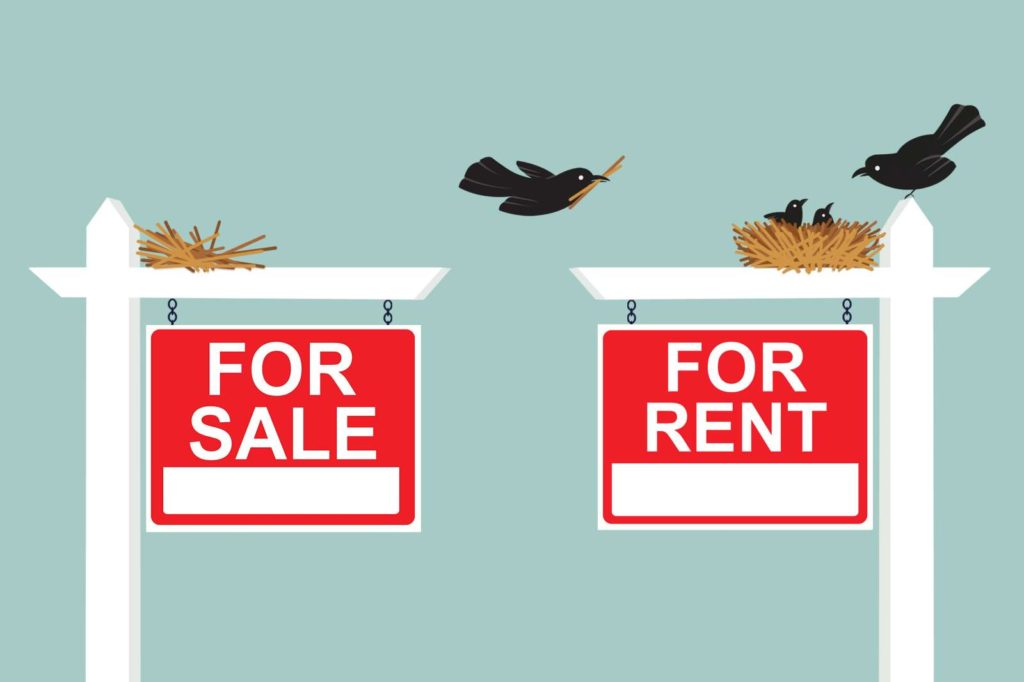
Cramped in a one-bedroom, new parents Kristina and David Mahon were desperate to buy a larger home. But after scouring the Pompano Beach, Florida market for nearly a year (and losing out on 20 houses in the process), the pair eventually gave up.
Now, the couple — with a 10-month old baby in tow, no less — are renting, a decision Kristina says they felt “forced” into.
“I feel like I’m wasting money for something that’s not mine,” Kristina says. The rental“options were very limited, and the prices were on the high side of what we were comfortable spending on a rental.”
The Mahons’ is a common storyline these days, according to those in the industry. Burned-out house hunters are tired of bidding wars, rising prices and dwindling options and are bowing out of the purchase market, opting to rent instead.
“It’s common given the current market and environment that we are in,” says Kaley Tuning, the Native Realty agent who worked with the Mahons. “It just becomes frustrating for the everyday buyer. I’ve had buyers bid upwards of $40,000 over asking price and still get outbid.”
Unfortunately, the pivot to renting isn’t always easy. While the move may afford frustrated buyers time to wait out the competitive housing market, it often means entering an equally hot rental scene — one where rising rents and dwindling supply are growing concerns.
According to Realtor.com, median national rents grew a whopping 11.5% between August 2020 and August 2021. And rent applications? Those are up as much as 95% in some cities, according to apartment listing platform RentCafe.
For hopeful homeowners, it’s made for a unique catch-22 that’s as frustrating as it is costly.
Rents are on the rise
It’s no secret the housing market’s been hot this year. The purchase market has boomed in nearly every corner of the nation since last spring. Home prices are up 17% over the year, and inventory, while improving, is still near record lows.
The rental picture has been more mixed, though. At the start of the pandemic, vacancies in big cities rose and prices dropped, while demand for suburban rentals skyrocketed. Now, rents are bouncing back across the country, reaching well above pre-pandemic levels in many areas.
According to Realtor.com, the typical rent now clocks in at $1,633 per month — $169 more than this time last year and almost $200 more than 2019’s numbers. And in nearly half of the country’s biggest cities? Monthly starter home payments are more affordable than average rents.
The hot housing market has a lot to do with this spike in rent costs. With rising home prices and limited for-sale listings, more and more buyers are stepping back. This puts pressure on rental inventory and drives up rents.
As Lisa Harris, an agent at RE/MAX Center in Braselton, Georgia, explains, “Fewer homes listed for sale and much higher prices for them have kept many want-to-be buyers in their rental units, taxing the rental supply.”
The pandemic plays a role, too. Eviction bans have kept many non-paying renters in place, tying up units for much of the last year. While the CDC’s eviction moratorium was shot down late last month, the experience has made many landlords warier than ever.
“Not only have the prices increased, but the demand on tenant screening seems to be getting much more stringent,” Harris says. “Landlords are seeking tenants with higher credit scores, higher deposits, no pets, a clean criminal history and more.”
The trickle-down of higher rents
Alex Lashner, like the Mahons, has experienced the difficult rental market firsthand. She even had to expand her rental search to account for price increases and is now looking as far as 90 minutes from her office just to stay on budget.
“I’m hoping it will be a short-term sacrifice so I can buy closer to my workplace a few years down the line,” she says.
Lashner was originally looking to buy her first home somewhere in Bucks County, Pennsylvania, but due to the competitiveness of the market — and her refusal to waive contingencies or overpay (as many buyers are forced to do lately), she lost out on every property she bid on. She finally opted to rent, only to find rising prices there, too.
“I’m frustrated that buying a three-bedroom home in my budget is cheaper than renting when you compare the monthly costs of a mortgage, property taxes and HOA fees versus the rental costs for a two-bedroom or even a one-bedroom apartment,” Lashner says. “That’s where my real sticker shock is.”
Rising rents are more than just a budgetary strain for hopeful buyers, though. They also make it harder to save, which could push back those homebuying goals even further. The Mahons are one household in that camp, something Kristina calls “frustrating.”
“Instead of us paying down our own mortgage and building equity, we are paying someone else’s mortgage,” she says. “For the next year or as long as we are renting, we will not be able to save as much as we had hoped.”
Buyers who are forced to sign long-term leases have another dilemma, too: What if mortgage rates go up?
Interest rates have been hovering near historic lows for months now and have played a major role in boosting buyer demand. Kristi Nowrouzi, a mortgage loan officer with Geneva Financial, says many buyers who have backed out of the market recently are concerned those conditions could change.
“There’s a fear of missing out on the low-interest-rate environment,” Nowrouzi says. “Inflation is blowing up and who knows what rates will look like next year at the end of an annual lease agreement.”
What’s the solution?
One option for buyers facing sky-high rents is to opt for a month-to-month lease. The flexibility usually comes with a slightly higher monthly rent, but it ensures you can act quickly should the right house hit the market.
“By doing a month-to-month lease, even though rent might be slightly higher than signing a long-term lease, they can be ready to take action,” says Shmuel Shayowitz, president and chief lending officer at Approved Funding, a mortgage lender in New Jersey. “They can also continue to actively look for homes and, even if pricing doesn’t soften, be in a better position to act.”
Fortunately, strategies like this might not be necessary for long. Buyers still face plenty of challenges, but recent data points to growing housing supply — particularly in the starter home segment. Existing home sales have also slowed, falling 2% in August, and price growth has decelerated as well. According to Realtor.com, 17% of all listings had price reductions in August.
“The market is absolutely shifting now, and prices are decreasing a bit and sellers aren’t getting as high price per square feet as they were a few months ago,” Nowrouzi says.
A completely cooled-off market, though? That could be a long way in the future. Until then, Tuning says, “Patience is a virtue.”
为解住严重宅荒 美联邦政府要盖10万户平价宅
来源:经济日报
9/02/2021
在美国房价持续高涨之际,白宫官员表示,美国政府为纾解严重住宅荒,将采取一系列立即可实施的步骤,以现有经费和权力,在未来三年兴建、销售10万户平价住宅。
路透引述官员说法报导,这套计划最快1日宣布,将聚焦于扩大对个人和非营利机构销售房屋,同时对大型投资人买房设限。第2季全美各地每售出六户住宅,就有一户被投资大户买走。
美国房屋需求在新冠肺炎疫情爆发初期激增,反映民众为居家办公和学习购置更宽敞的房子。但待售屋不足和供应链瓶颈把房价推得更高,租金行情跟着水涨船高,加重家庭财务负担。白宫官员说,全美平价住宅估计短缺多达400万户。
白宫官员表示,美国总统拜登(专题)已提议,斥资逾3,000亿美元增建200万户平价住宅,这项措施是3.5兆美元基础建设投资案的一部分,正在国会审议中。但拜登希望推动立即可行步骤。
这套新计划将涵盖乡村与都会地区的住宅建案,重点摆在平价房市,希望能协助房屋自有率偏低的有色人种族群。
此计划将由美国住宅与都市发展部(HUB)部长法吉(Marcia Fudge)宣布,具体行动由该部、财政部及房贷机构房利美(Fannie Mae)与房地美(Freddie Mae)等联邦监管机构共同规划。“两房”合计占全美11兆美元房贷市场的一半。其中,一大关键步骤是重启曾由财政部与HUB合办但在2019年结束的“风险分摊计划”,该计划让各州住宅金融机构能扩大提供低利贷款,促进兴建平价住宅。
此计划也将提高组合屋及二至四户多户型不动产的供应量,希望透过房地美扩大融资达成目标。同时也将采取行动,限制对大型投资人销售一些由联邦住宅管理局(FHA)提供担保的不动产。
拜登政府另打算与各州和地方政府合作运用现有联邦资金,并协助减少排他性分区(exclusionary zoning)等阻挠提高住宅供应量的做法。
White House tackles housing shortage with plan for 100,000 affordable homes
By Andrea Shalal
9/02/2021
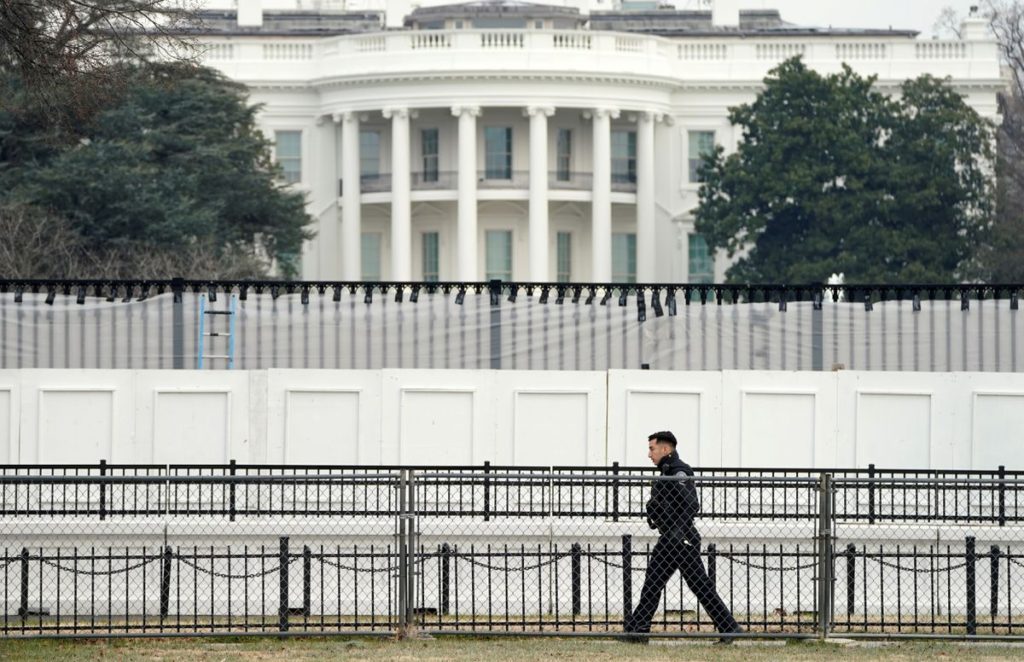
WASHINGTON, Aug 31 (Reuters) – The Biden administration is taking steps to address a severe housing shortage in the United States by creating and selling 100,000 affordable homes over the next three years using existing funds, the White House said on Wednesday.
The moves will focus on boosting home sales to individuals and non-profit organizations, while limiting sales to large investors, who scooped up one in six homes sold in the second quarter, according to a White House statement.
Demand for housing soared early in the pandemic as Americans sought more spacious accommodations for home offices and home schooling, but a shortage of homes for sale and supply chain bottlenecks have driven housing prices sharply higher.
Rental prices, which typically follow the lead of house prices, are also a big concern, given that even before the pandemic 11 million families – or nearly a quarter of all renters – were already spending more than half their income on rent, according to the White House.
The United States has an estimated shortage of as many as 4 million affordable housing units, White House officials say.
U.S. President Joe Biden has proposed spending over $300 billion to add 2 million more affordable housing units as part of a $3.5 trillion investment package being considered by Congress, but wanted to push forward with immediate steps that could be taken now, the White House said.
The plans will cover rural and urban housing projects, with a focus on aiding communities of color, where home ownership rates have lagged historically.
U.S. Housing and Urban Development (HUD) Secretary Marcia Fudge will announce the measures after touring a new five-story affordable housing complex in Philadelphia on Wednesday.
Fudge called the initiatives “significant downpayment” on Biden’s commitment to boost the supply of affordable rental housing, expanding access to capital for state Housing Finance Agencies, empowering local communities to build more affordable housing and promoting equitable housing policies.
Specific actions are planned by Fudge’s department, the U.S. Treasury and agencies such as Fannie Mae and Freddie Mac, which will increase financing opportunities to enable more Americans to purchase homes, the White House said.
One key step is the revival of a joint Treasury-HUD “Risk Sharing Program” that ended in 2019 and that will enable state housing financing agencies to provide more low-cost capital for affordable housing development.
The plans will also boost the supply of manufactured housing and 2-4 unit properties by expanding financing through Freddie Mac, while taking steps to limit the sale of some U.S. Federal Housing Administration-insured properties to large investors.
Investor purchases, which have been as high as one in every four homes in some communities, have driven up prices for lower-cost houses and triggered fierce competition for starter homes, the White House said.
The administration also plans to work with state and local governments to leverage existing federal funds, and help reduce exclusionary zoning and other practices that have discouraged efforts to boost the supply of housing, the official said.
The Federal Housing Finance Agency “will begin to study the interaction between exclusionary zoning and our regulated entities,” said acting Director Sandra L. Thompson.
如何计算一个投资房产的租金回报率?
By Willy Rong
3/07/2021
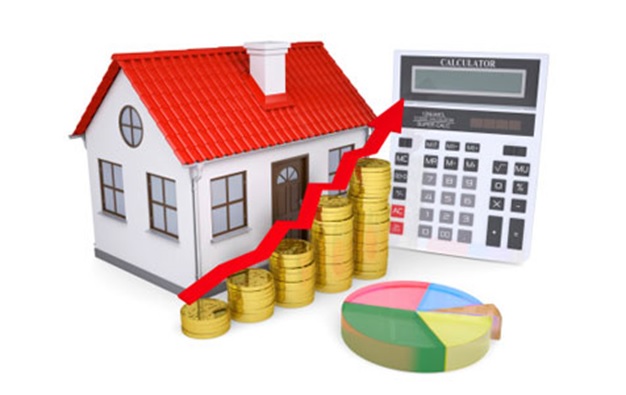
一直以来都有人问我,如何计算一个投资房产的租金回报率?我答过,但总是似是而非。
今天就这个问题给出我的计算公式Return Of Investment (ROI),仅供大家参考。
这个问题要从两方面讨论,看你是全额现金买房?还是贷款80% 买房?
(全额现金买投资房产)租金回报率 = (12月的租金 – 一年的各种花费)/ 买房价
(贷款80%买投资房产)租金回报率 = (12月的租金 – 一年的各种花费和贷款 )/ (
20%首付+ Closing Cost )
我们还是以一个$38万美元买房实例来计算,比较直观:
房子开支预算:
HOA $38/月; 保险 $120/月; 税 $356/月; 维修 $100/月。
共计 $614。
贷款 80%, 约每月还贷$1500;
租金每月$2350;去掉开支 $614; 每月净收入 $1736;
一年的总收入 $20832。
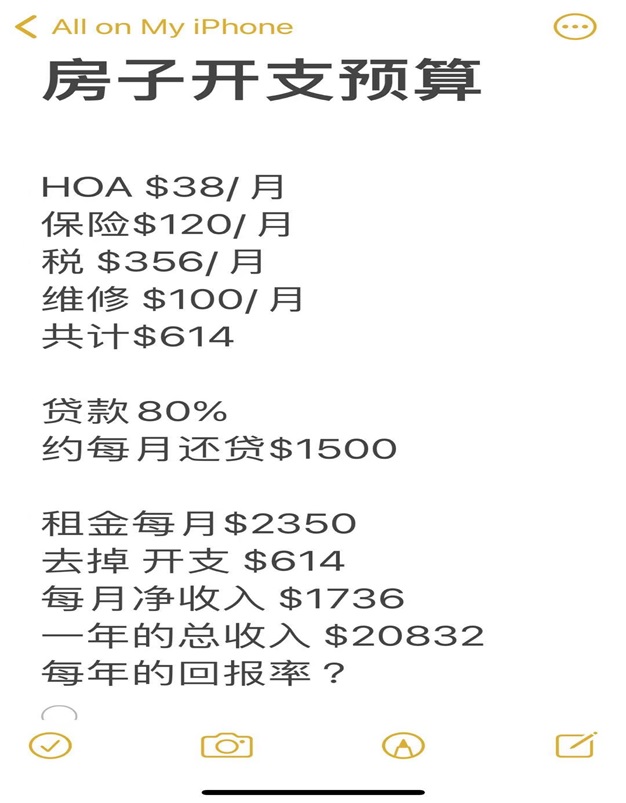
问:一个$38万美元的房产,每年的回报率?
(全额现金买投资房产)租金回报率 = (12月的租金 – 一年的各种花费)/ 买房价
$38万美元房子的租金回报率 = 一年的总收入 $20832 / 买房价$380,000 = $0.0548
全额现金$38万美元房子的租金回报率一年约为:5.5%;
(贷款80%买投资房产)租金回报率 = (12月的租金 – 一年的各种花费和贷款 ) / (
20%买房首付 + Closing Cost)
$38万美元贷款80%房子的租金回报率 = (一年的总收入$20832 – $18000) / (首付 $
76000 + $5000 Closing Cost ) = $0.0349
$38万美元贷款80%买投资房产的租金回报率一年约为:3.5%.
这个$38万美元的房子在最好学区,房子升值潜力大!
考虑到加上房子产权equity 上涨的因素,一年在6%-8%。所以要加上一个Equity 增值
率,换句话说,是用$81000 买了一个$38万美元的房产,是用杠杆买的房子。
这里有2个概念:一个是租金回报率;一个是Equity 回报率;
利用杠杆买房,就要让银行在这个房子上也赚一些钱,所以贷款租金回报率3.5%.要低
于全额现金租金回报率5.5%,这个逻辑是对的,那个2% 回报率的差让银行赚去了。
什么是智慧?智慧就是解决问题的能力!
能够把一个复杂问题简单化,用直白的方式讲清楚,这也是智慧。
现在亚特兰大地区(佐治亚),一个房子的租金回报率大概在3% ~ 6%左右,真心话,
投资房净租金回报率6%是一个不错的回报。
你若嫌上面二手房一年的租金回报率还低,你可以全现金买126包租5年的项目,一年的
租金回报率为净6%。
下面是在网上找到的租金回报率计算器,大家可以去练习:
租金回报率
https://www.calkoo.com/zh/zujin-huibao-lu
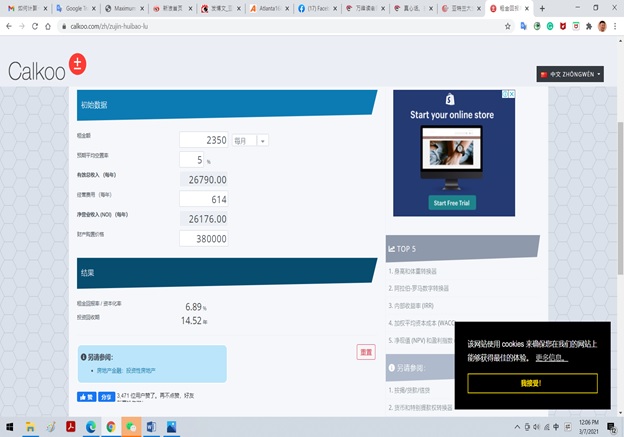
提示:算大账不算小账,可能公式不够严谨,但逻辑是对的。
Source: http://www.mitbbs.com/article_t/Georgia/31320547.html
Six Spaces Home Staging
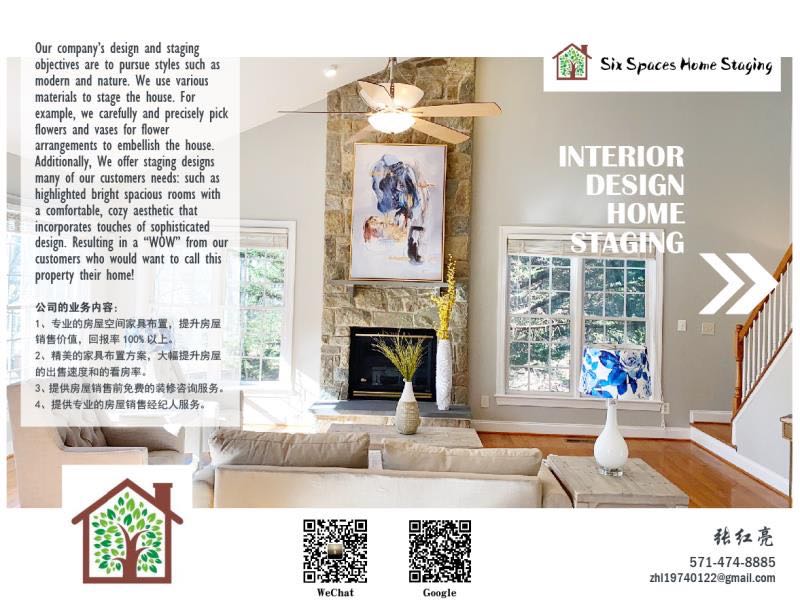
Contact: Hongliang Zhang
Tel: 571-474-8885
Email: zhl19740122@gmail.com




